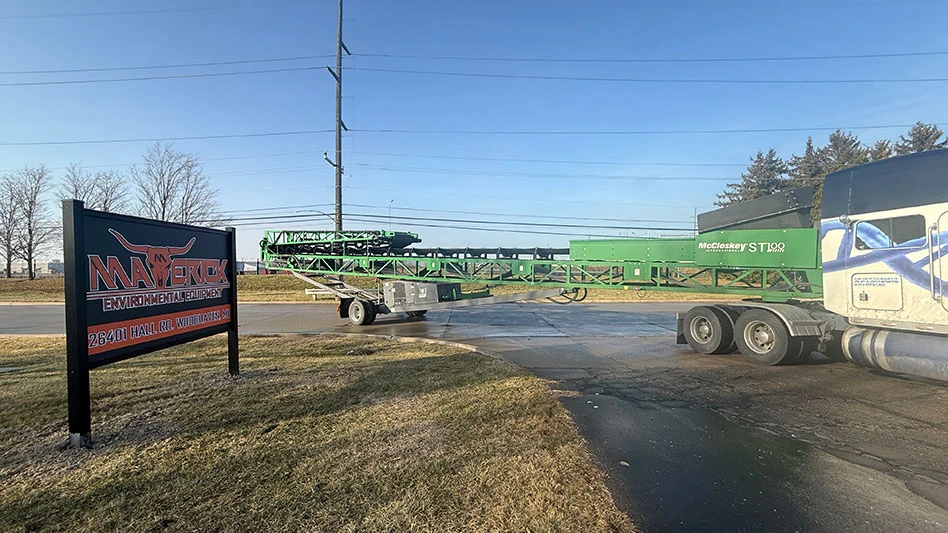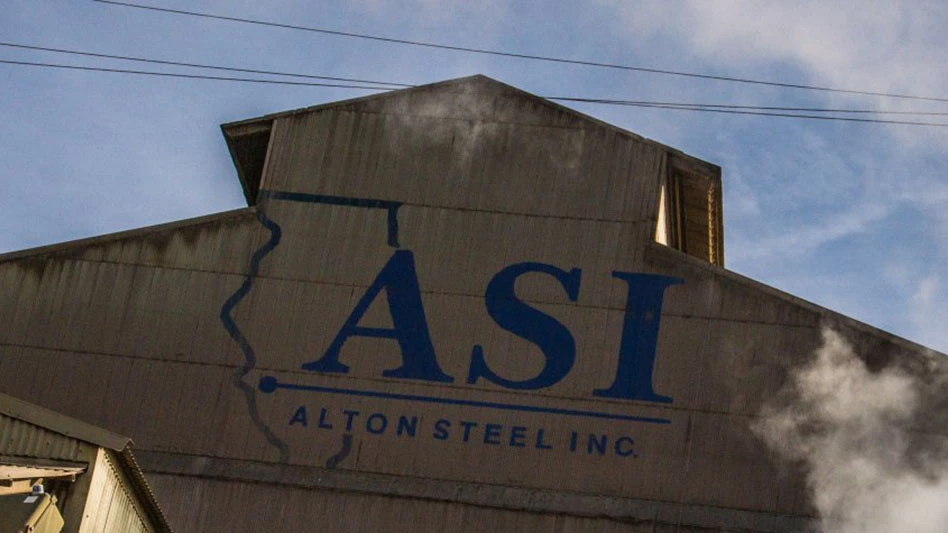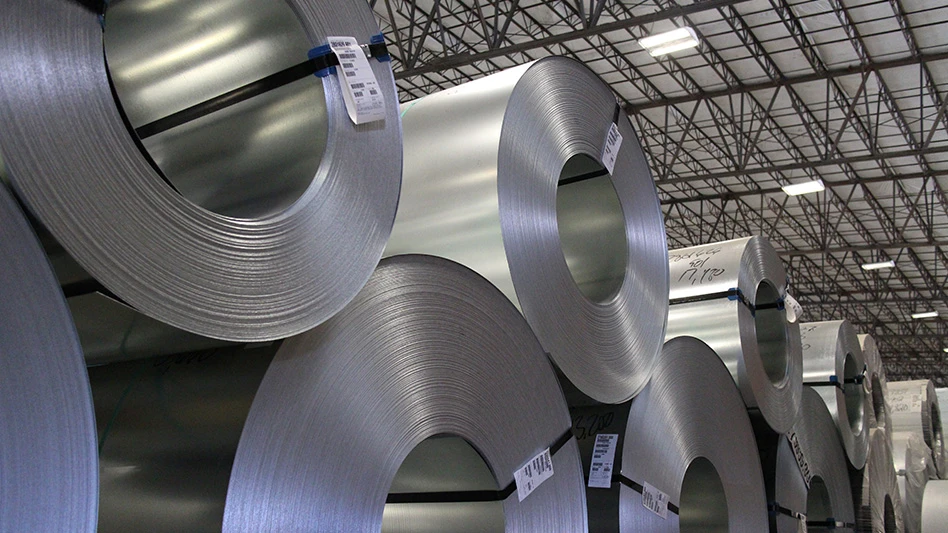Last year, 420 million oil filters from passenger cars and trucks were replaced in the United States, according to the Filter Manufacturers Council of the Motor & Equipment Manufacturers Association, Research Triangle Park, N.C. Of those, about 88 million were recycled, for a 21 percent recycling rate. Typically, these filters are hot drained and crushed on the spot or sent to a processor to be crushed and delivered to the mill for remelt. However, there have been some problems with this process.
Crushing filters into cubes or flat cylinders leaves the paper filtering element and residual oil inside. Some mills have experienced fires in their baghouses because of the contamination, and others are concerned about the possibility of oil dripping out of the crushed filter casing. The result has been changes in the way mills treat used oil filter scrap.
One large end user of steel from discarded oil filters is TAMCO, Rancho Cucamonga, Calif. The minimill is currently melting about 100 tons a month of filter scrap from several vendors. “We prefer filters without the paper filter element, because there is less oil in them,” says Hiro Miyakawa, vice president of purchasing for TAMCO. “We will take crushed filters with the elements still inside, but we are very careful. Already we have had two fires in our baghouse because of the filter elements and oil, and it has cost us about $1 million to repair.”
A spokesperson from Cascade Steel Rolling Mills, McMinnville, Ore., indicates that the company only accepts filters with the element removed. The mill accepts about 8 tons of filter scrap per month.
Scrap purchasing agents for other mills simply say they won’t touch steel from used oil filters because of the contamination risk, and those that do accept crushed oil filters pay lower prices for the scrap – as much as $30 to $60 a ton less than for clean scrap.
CUT THEN CRUSH
Because of this shift in used oil filter scrap usage, recyclers are being forced to look for alternative processing methods. One alternative method to crushing is decapping. This method is used by Oil Wringers Inc., Farmington, Minn. Oil Wringers uses a filter cutting system that was developed by the owner, Tom Thorne, and is now marketed by Mikron Corp., Mendota Heights, Minn.
The 5-foot by 3-foot cutting machine cuts one end off the filter so that the element falls out. The filter elements are then placed in a compactor where more oil is squeezed from them. After that, the elements can be landfilled in Minnesota because they no longer contain any free flowing liquid. The steel casings are also compacted. Any oil that is removed is collected and given to a paving company for free, where it is used to prepare asphalt. Oil Wringers’ Mikron machine, which has three cutting heads, can process about 1,200 filters an hour. It can process small to heavy-duty filters from large trucks.
Thorne says he developed the machine and went into the used oil filter recycling business out of need. “We were making trash compactors and filter crushers, but soon found out that many small businesses, such as gas stations, did not want to crush them – they just wanted to get rid of the filters,” he says. “Also, those who were crushing filters soon found out that many scrap yards stopped accepting them, and that was because the yards were having a hard time selling the filters to the mills.” In fact, three processors who were recently crushing filters have asked Thorne to take over their accounts because they could not get rid of the filters cost-effectively.
Today, Oil Wringers collects and processes approximately 500 55-gallon drums a month of filters from 800 accounts. Each drum contains about 260 filters, and it normally takes 16 barrels to get a ton of steel. The company gets income from two venues. “One, we charge $50 per drum for pickup,” says Thorne. “Two, we get about $100 a ton for the scrap metal from the filters.”
Another company that decaps filters is BWW Recycling, Marietta, Ohio. Like Oil Wringers, the company cuts the filters open and removes the elements inside, then compacts the steel casings into bundles. “The great thing about our operation is that the scrap metal yard that we deliver the bundles to does not have to fool with them,” says Mike Brown, owner of BWW Recycling. “And we get top dollar.”
Brown is currently stockpiling the removed filter elements because he doesn’t want to landfill them, although it would be legal to do so under Ohio regulations. Instead, he is looking at other options, including a centrifugal processing method that would spin residual oil out of the fiber material. “There is still a lot of oil in these filters when we get them,” he says. “The filters are required to be hot drained, but many of the ones from passenger cars are not, and there could be almost a foot of oil in the bottom of a 55-gallon drum when we go to pick it up.” The loose oil is not a problem because Brown employs a Clean-Burn oil heater built to burn used oil.
As for Mikron, in addition to the three-head industrial size used oil filter cutting machine, the company has introduced a new single-head cutting one for smaller businesses. “It’s designed for operations such as repair shops and municipality garages,” says Randy Pentel owner of Mikron. “You can fit a 55-gallon drum directly under the cutting head.”
Mikron has also teamed up with a manufacturer of specialty-designed cleaning ovens that heat the cut filters to remove residual oil and turn the paper element to ash. “The result is a very clean steel that yards are willing to pay double for,” says Pentel.
SHRED AND SEPARATE
Another method for preparing oil filters to mill specifications is to cut the filters open and shred the casings. This method is used by ProCycle Oil and Metals, Springtown, Texas, which claims to be the largest used oil filter recycler in the South with more than 3,000 customers in 11 states.
ProCycle uses a multi-step process. Filters are first crushed to remove most of the oil, and then they are shredded. The shredded filters are sent to a thermal unit where the material is heated without air. After the pyrolysis process, the clean steel is removed and sent to Chaparral Steel Co., Midlothian, Texas, and to Gachman Metals & Recycling, Ft. Worth, Texas. The filter element becomes an ash that is used in making concrete, and the remaining oil is collected and sent to a re-refinery.
“It’s a very complete, closed-looped process – everything gets recycled,” says John Barber, president of ProCycle.
Like Oil Wringers, ProCycle charges its customers a pickup fee to cover costs. “They pay me a fee to pick up the filters, because without it I would not be able to sustain operations by just selling the steel, ash and recovered oil,” says Barber.
Although Barber is proud of the filter recycling itself, he is especially proud that his company diverted almost a half a million gallons of oil from Texas landfills last year alone. In addition, the company offers its customers a used antifreeze recycling service, and provides them with spill containment and absorbent products to use when handling oil. The used containment products are collected and recycled by ProCycle with a new proprietary method that has a patent pending.
Safety-Kleen, Elgin, Ill., is another company that shreds used oil filters then separates the steel from the paper element. The steel is also steam stripped of oil before it is baled, and the elements are burned in cement kilns. The company is the largest recycler of oil and used oil filters in the U.S., with three filter processing plants in Ohio, South Carolina and Texas, and 160 collection branches nationwide.
Also, American Pulverizer Co., St. Louis, recently installed a system for Oil Filter Recyclers Inc., Zimmerman, Minn., that shreds filters for oil separation and size reduction, and liberates paper, plastic and metals in a second stage at a rate of 2 to 20 tons per hour.
|
Used Oil Filter Bans |
|
Four states currently ban used oil filters from landfills, according to the Filter Manufacturers Council, Research Triangle Park, N.C.: Texas, Minnesota and Rhode Island. In addition, Florida has a commercial ban only, meaning do-it-yourselfers can dispose of filters. California bans used filters under a hazardous material ban, and requires all used oil filters to be recycled. Most states follow the federal guidelines that require used oil filters to be hot drained for at least 12 hours. FMC recommends that if personnel are not sure about federal or state regulations, they should contact the council’s toll-free filter hotline at (800) 99-FILTER. Additionally, generators should seek advice from their locality before disposing of filters. |
NO SHIFT HERE
Even though there is a trend away from crushing used oil filters, some processors still crush them. For example, Vortex, Santee, Calif., places whole filters into a specially designed compactor that makes the resulting bricks “very tight,” according to Don Kleine, owner of the company.
“Because the bricks are compacted so tightly, and because they are larger than other bricks being produced, the BTUs are released more slowly in the furnace, and you don’t have many problems,” he says. Kleine claims this is the only “true” way to recycle the entire filter, and points to the landfilling the of filter elements as a concern with other processing methods.
Mills in Mexico accept the crushed filter bricks, but those mills are only paying Vortex about $50 a ton for its product.
On the consumer side, U.S. Foundry and Manufacturing, Medley, Fla., uses about 500 tons of used oil filters per month. But unlike the mills, U.S. Foundry still accepts the filters with the paper element inside. “We have been doing this for about four years now,” says Joseph Cipriano, material manager for U.S. Foundry. “We started slowly and have worked our way up to the level that we are at today.”
The company has a special covered staging area where the crushed filters are placed so that any residual oil can be drained. “We use Cupola-type furnaces, so the filters are preheated, and that helps, too,” says Cipriano.
Currently, U.S. Foundry is paying about $40 a ton for used filters, but will pay up to $100 a ton if the filters are clean steel only. “The processor has to look at what is feasible for his operation to make money,” says Cipriano. “For many, it is more profitable to just send us the whole filters.”
Overall, there does seem to be a gradual shift taking place in the used oil filter recycling niche, according to Greg Griggs, executive director of the Filter Manufacturers Council. “Some mills and foundries are now requiring recyclers to remove the filter element, but it is not universal,” he says. “It definitely could go that way, but right now it is hard to tell because this industry is still very young. What we are seeing is that those companies that are delivering clean steel scrap from used oil filters are larger recyclers who have the economy of scale to do so.”
The author is managing editor of Recycling Today.

Explore the October 1996 Issue
Check out more from this issue and find your next story to read.
Latest from Recycling Today
- Stadler equips Spanish MRF
- SSAB finishes 2025 with decreased revenue
- Vecoplan appoints CFO
- Aurubis raises full-year forecast
- Levitated Metals adds LIBS sorting technology
- Redwood Materials closes on $425M in Series E financing
- Updated: Wieland Chase expands northwest Ohio facility
- Recovered paper traders report lukewarm market





